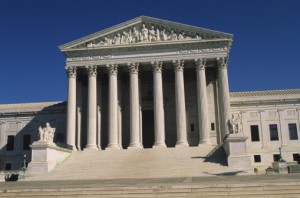By Susan Brinkmann, OCDS
Staff Journalist
In a ruling that may prove pivotal for religious organizations in the future, the Supreme Court decided to let stand a lower court decision in favor of a religious employer’s right to make employment decisions based on religious beliefs.
 Christianity Today is reporting that the justices opted not to hear the case of Sylvia Spencer et al vs. World Vision which was brought by three employees of World Vision who claimed they were fired because they admitted to not believing that Jesus Christ is fully God. The former employees tried unsuccessfully to convince the Ninth Circuit Court of Appeals that World Vision is not a religious organization because its charitable work is not inherently ”religious” but more like that of a Red Cross.
Christianity Today is reporting that the justices opted not to hear the case of Sylvia Spencer et al vs. World Vision which was brought by three employees of World Vision who claimed they were fired because they admitted to not believing that Jesus Christ is fully God. The former employees tried unsuccessfully to convince the Ninth Circuit Court of Appeals that World Vision is not a religious organization because its charitable work is not inherently ”religious” but more like that of a Red Cross.
The Ninth Circuit decided that an organization is religious if it has a self-identified religious purpose, acts consistently with those purposes, and promotes itself publicly as religious. But the court did not rule on whether World Vision’s humanitarian work is religious. “Making that determination,” the court said, “runs counter to the core of the constitutional guarantee against religious establishment.”
An appeal to the U.S. Supreme Court resulted in an October 3 decision to let the lower court ruling stand.
“Today’s action by the U.S. Supreme Court represents a major victory for the freedom of all religious organizations to hire employees who share the same faith–whether Muslim, Buddhist, Jewish, Christian, or any other religion,” World Vision U.S. president Richard Stearns said in a press release. “I am pleased, relieved and gratified with the court’s action. After four years of litigation, we at World Vision U.S. may now put this matter behind us, and continue our policy of hiring Christians.”
The Cardinal Newman Society (CNS), which is dedicated to preserving the Catholic identity of Catholic universities, believes the decision will prove important for Catholic colleges and other organizations that are meeting with legal challenges directed at their Catholic identity.
“Federal agencies have recently challenged the longstanding notion that that Catholic institutions serving partly non-Catholic populations and legally independent of the Church are truly religious organizations,” CNS writes on its website. “The World Vision ruling gives deference to an organization claiming a religious mission even for activity that some might regard as secular in its purpose.”
According to CNS, the National Labor Relations Board (NLRB) has ruled twice in 2011 that Catholic colleges — Manhattan College and St. Xavier University — are not religious enough to be exempt from the Board’s jurisdiction over labor relations, despite federal court rulings instructing the NLRB to stop interfering with religious colleges.
In addition, CNS and 18 Catholic colleges recently challenged Health and Human Services regulations on health insurance that include a religious exemption, but narrowly define a religious employer as a church entity that serves and hires primarily people of the religion professed by the employer.
With the lawsuit settled, Stearns now hopes World Vision can continue its work to serve the world’s poor.
“Our Christian faith has been the foundation of our work since the organization was established in 1950, and our hiring policy is vital to the integrity of our mission to serve the poor as followers of Jesus Christ,” he said. “My colleagues and I at World Vision have an uncompromising commitment to serve the poor in the name of Christ. We serve all people, regardless of religion, race, ethnicity or gender and strive to demonstrate God’s love and compassion through our work.”
© All Rights Reserved, Living His Life Abundantly®/Women of Grace® http://www.womenofgrace.com









